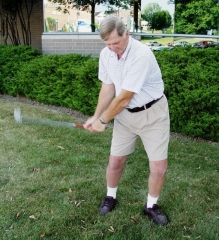Press release from the Lutheran Health Network:
Next Generation Knee Implant Has Potential to Last Twice as Long as Current Implants
New total knee implant offered at The Orthopaedic Hospital withstood 30 years of simulated wear performance in lab tests(July 26, 2010) – For years, orthopaedic surgeons have cautioned knee replacement patients with the same warning – any implant can fail after years of use, and if that happens, it has to be repaired. While that message is still true, the likelihood of a patient’s knee implant failing due to normal wear has been significantly reduced thanks to VERILASTâ„¢ knee technology, which is now being used by Timothy van de Leur, MD, at The Orthopaedic Hospital of Lutheran Health Network.
“Every year, I see a growing number of younger, active adults who need to have their knees replaced so they can get back to their normal, pain-free lives,” said Dr. van de Leur. “Unfortunately, one of the major drawbacks for these physically active patients has always been the potential that they would wear out their implants. When that happens, a second surgery and recovery is necessary.”
A new option for total knee replacement could make the need for an additional surgery during a patient’s lifetime less likely.
Smith & Nephew, the medical device maker that developed the VERILAST technology, was granted clearance by the Food and Drug Administration this spring to make a 30-year knee claim based on extensive laboratory testing. According to Smith & Nephew, Dr. van de Leur, a member of Fort Wayne Orthopaedics, is the only surgeon in northeastern Indiana offering the 30-year knee option.
“Physically active patients want to end their knee pain for good,” said Dr. van de Leur. “I want to offer my patients a knee implant that lasts, and I’m pleased VERILAST technology has been wear tested to 30 simulated years out for use in a field that currently views 10 to 15 years as the gold standard. This is not an incremental improvement; it’s a generational leap forward for active patients.”
Over the last three months, van de Leur has implanted more than 50 total knees at The Orthopaedic Hospital using the 30-year knee. Patients like 60-year-old Scott Lougheed, a local engineer and former Purdue University football player who had both his knees replaced, are already seeing the benefits.
“Prior to my surgery seven weeks ago, the pain in my knees had gotten so bad that I was forced to give up many of my activities,” Lougheed said. “With these implants, and because of a solid regimen of pain management, serious dedication to physical therapy and great caregivers, I was able to play golf 15 days after leaving the hospital. Now I can play 18 holes and go home experiencing no discomfort whatsoever.”
A three-sport star at South Side High School and a two-sport standout at Purdue, Lougheed had battled numerous knee issues since a rugby injury at the age of 22. Multiple surgeries, medications and therapies couldn’t alleviate his discomfort, yet physicians continued to take a wait-and-see approach knowing the implants available at the time might not be the long-term answer.
“Knowing this knee implant can last longer is really a boon for people my age,” Lougheed said. “I think the fear in the past from physicians was they didn’t want patients to outlive their implants and need more surgery.”
Now Lougheed, who shares the record at Purdue for most punts in a single game with 12, is quickly working his way back to the active lifestyle that has long been a big part of his normal routine. “The other day I caught myself walking fast with no pain and realized I hadn’t been able to do that in years,” he added.
Data reviewed by the FDA before it allowed Smith & Nephew to make the 30-year knee claim illustrates why VERILAST technology shows such great promise.
The 30-year knee made with VERILAST technology was subjected to the equivalent of 45 million steps or approximately 30 years of an active adult’s life under typical conditions. Lab tests showed that after 5 million steps, the knee reduced wear by 98 percent compared to a knee made with the traditional implant materials. At the 45 million mark, the knee reduced 81 percent of the wear when again compared to the 5-million-cycle knee implant made from traditional materials.
This is the first knee implant to be lab tested for 30 years of simulated wear performance, more than double the length of other tests.
“For a younger, more active patient, this makes perfect sense,” Dr. van de Leur said. “They get the pain relief they need, the mobility they want and the longevity they expect.”
